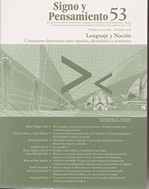Abstract
This paper seeks to analyze the discourse of the main presidential candidates in Colombia for the 2006–2010 term, as well as that of the journalists who interviewed them on the main radio stations of the country. To cover the problem, we resort to two different analytical perspectives: the theories proposed by Veron and Potter in order to analyze the way speech is constructed, and in particular, the rhetoric it is based on. Furthermore, Bourdieu’s sociological theory is employed to better understand how the speakers’ profession and modus operandi influence the way they construct their discourses. After examining more than 20 interviews, it is possible to attest that a common structure exists in the electoral and journalistic discourses studied.This journal is registered under a Creative Commons Attribution 4.0 International Public License. Thus, this work may be reproduced, distributed, and publicly shared in digital format, as long as the names of the authors and Pontificia Universidad Javeriana are acknowledged. Others are allowed to quote, adapt, transform, auto-archive, republish, and create based on this material, for any purpose (even commercial ones), provided the authorship is duly acknowledged, a link to the original work is provided, and it is specified if changes have been made. Pontificia Universidad Javeriana does not hold the rights of published works and the authors are solely responsible for the contents of their works; they keep the moral, intellectual, privacy, and publicity rights.
Approving the intervention of the work (review, copy-editing, translation, layout) and the following outreach, are granted through an use license and not through an assignment of rights. This means the journal and Pontificia Universidad Javeriana cannot be held responsible for any ethical malpractice by the authors. As a consequence of the protection granted by the use license, the journal is not required to publish recantations or modify information already published, unless the errata stems from the editorial management process. Publishing contents in this journal does not generate royalties for contributors.


